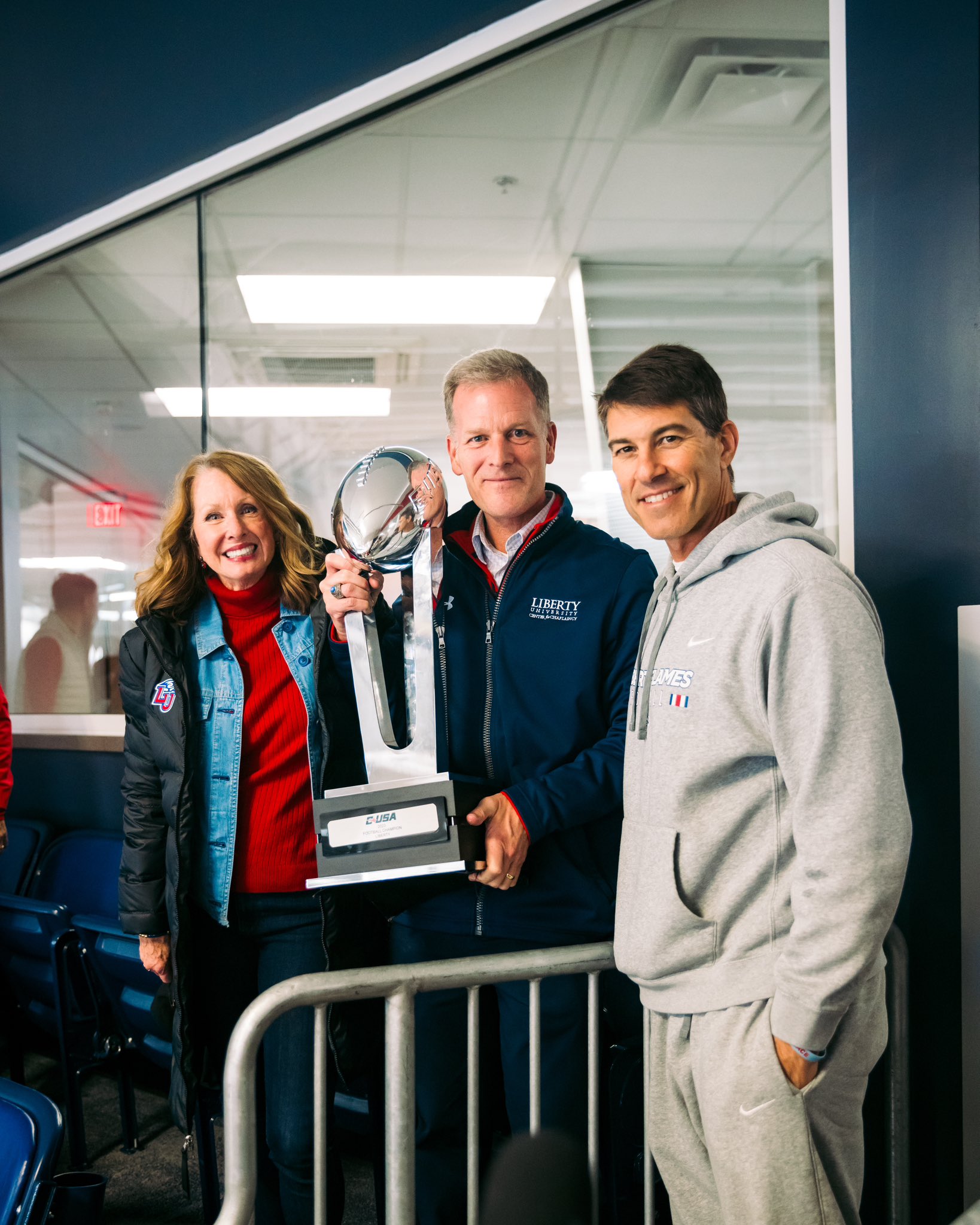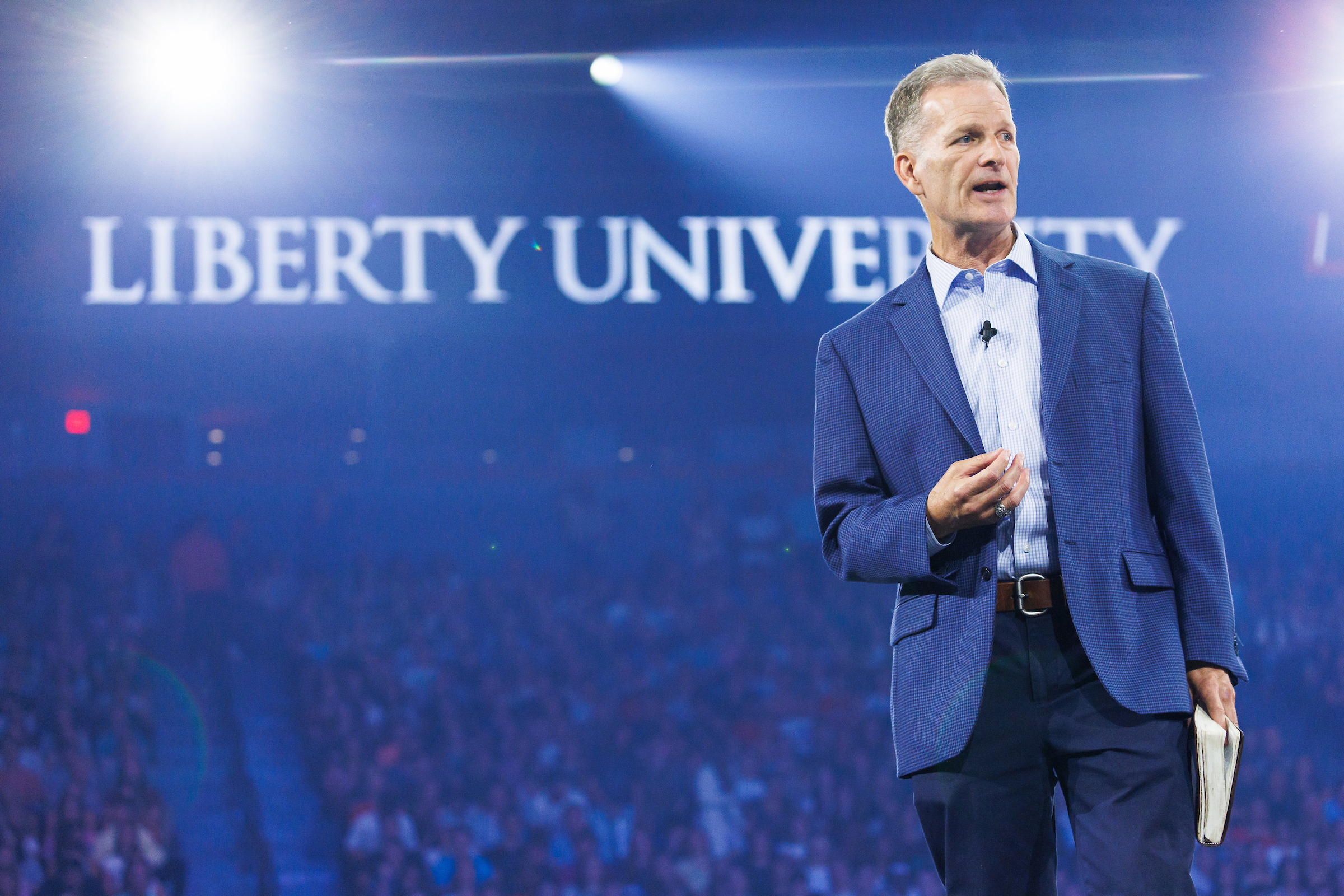The new leader of Liberty University says he will continue the school’s mission to educate and equip the kind of workforce needed by the world’s fastest-growing companies.
On October 26, Dr. Dondi Costin was officially installed as the sixth president in the history of the school, founded by the late Jerry Falwell Sr. in Lynchburg, Virginia, in 1971. With a total residential and online enrollment of more than 130,000 students, Liberty (LU) ranks as the largest higher education institution in the state and one of the largest in the world.
Costin, who served as a chaplain in the U.S. Air Force for 22 years and is now a retired major general with 36 years of military service, came to LU from Charleston Southern University, where he served five years as president of the South Carolina school.
From his office on the 7,000-plus-acre campus on Liberty Mountain, he talked with me via videoconference on November 9. Here is an edited excerpt of that exchange:

Alongside his wife Vickey Costin and Liberty Head Football Coach Jamey Chadwell, Liberty University President Dondi Costin holds the Conference USA Football Championship trophy following Liberty’s 49-35 win over New Mexico State in the C-USA title game played December 1 at Williams Stadium in Lynchburg, Virginia. The win catapulted the Flames to their first ever New Year’s Six Bowl game, set for January 1 vs. Oregon in the Fiesta Bowl in Glendale, Arizona.
Photo courtesy of LU Football
What are Liberty’s greatest strengths in the area of workforce development?
COSTIN: We have four major strengths. The first is our strategic commitment to serving industry. For instance, we make sure that there is a need in the workforce for the degree, and then we consult with industry leaders and stakeholders to make sure that the degree that we execute is one that that is going to make a difference. Second is that every student is encouraged to be engaged with local industry. Third, every student is required to fulfill a number of community service hours per semester so that they get to know the people and businesses in Greater Lynchburg. And fourth, Liberty is now and always has been on the cutting edge of academic programs.
Do you have any success stories you can share of LU grads who have made a significant difference in their career in Virginia?
COSTIN: One that stands out is a former football player from Nigeria. Samkon Gado came to the U.S. for high school. He played football at Liberty as a running back. He had a nice career in the NFL and played running back for the Green Bay Packers. Once his NFL career was over, he felt that he had a calling to become a doctor. He went to medical school in South Carolina. He felt a calling to impact his home country of Nigeria. He went back to Nigeria. He and his sister founded the Jonah Inheritance organization to reimagine healthcare in Nigeria from a Christian perspective. His ultimate goal is that he wants to build a self-sustaining hospital in Nigeria. He is making a difference in his native country today.
Another success story is Rachel Thompson, a graduate of our LU School of Law. After graduation, she went into immigration and adoption law at a law firm in Salem, Virginia. In 2016, she was awarded the Young Professional of the Year Award for Greater Roanoke. Like Sam, she is making a difference in this world.
How is the medical college at LU progressing?
COSTIN: The LU medical college is a huge success story at Liberty. We knew for a long time that we needed to be engaged in this field. That is why we founded the LU College of Medicine. LUCOM is doing very well. We have a 100% placement rate for residencies or research opportunities for our graduates. Our grads go to all the same places that grads from other top schools in Virginia do. We hear from employers all the time that there is an extra sense of dedication and patient care among our grads. Jesus in Scripture is referred to as the Great Physician. At Liberty, LUCOM learners are students of the Great Physician with an eternal perspective on healthcare and healing.
“We have a long history of being agile. We can turn on a dime.” – Dondi Costin, President, Liberty University
What are the long-term goals of the engineering program at LU?
COSTIN: One major goal we have is making sure in workforce development that we are producing the kind of engineers the city, region, state, country and world need to make things better. We have seen a lot of growth in civil engineering. We are doing really well in electrical engineering and mechanical engineering. Our grads are highly sought after. Long term, we want two things to happen: Produce a large number of highly trained engineers and produce faculty members who are qualified to teach. One of the key factors in economic development and site selection is this: Does the region have the ability to produce the kinds of workers we need to be successful? It must be a symbiotic relationship between the school and industry.
Do you get feedback from the CEOs who visit campus? If so, what do they say about the school and its students?
COSTIN: At our annual CEO Summit, we have three days where the room is filled with major CEOs from around the country. It is a student-run and student-led event. The CEOs engage with our students. Without exception, these CEOs say how professional, mature, positive and joyful our students are. They talk about the students’ character and the contagious spirit here.
What made you want to come to Lynchburg and take the job as the new president of Liberty University?
COSTIN: We were really happy where we were at Charleston Southern University. My life was altered in a very positive way during my time at Liberty as a graduate student. LU was on the cutting edge at the time — before there was an Internet and cell phones. Liberty found a way to bring the education to me while I was in the U.S. Air Force. I was able to use tuition assistance. I was able to earn a master’s degree and a seminary degree from LU. I was stationed at Langley Air Force Base in Virginia then. Liberty changed my life. That education enabled me to spend the next 22 years of my life as a chaplain in the U.S. Air Force and eventually become the 18th Air Force Chief of Chaplains.
“Liberty found a way to bring the education to me while I was in the U.S. Air Force. I was able to use tuition assistance. I was able to earn a master’s degree and a seminary degree from LU. Liberty changed my life.” – Dondi Costin, President, Liberty University
How did your career as a leader in the U.S. Air Force prepare you for this job?
COSTIN: It was really a much easier transition than I assumed it would be. We made a list of what we wanted to do after the USAF. I loved engaging with 18- to 22-year-olds who were away from home for the first time and doing their first job. I enjoyed having an impact on them as they were making life-changing decisions for themselves and their families. I taught ROTC classes at Texas Christian University in Fort Worth for four years. I have always enjoyed interacting with college students and helping them prepare for their future.
What have you learned about Liberty, and the surrounding community of Greater Lynchburg, in your time of service at LU so far?
COSTIN: There is a great relationship here between Lynchburg and LU. Liberty is the largest employer in the region. We provide close to a billion dollars in economic impact every year. Just about everyone is connected here in every way. Businesses are here to support the success and long-term impact of LU. It is a beautiful place with very kind people.
If you were sitting across the table from a CEO who is visiting your community, what would you say?
COSTIN: We understand the significance of economic development and the role that we play in workforce development. Because Liberty University is a private school, we have a long history of being agile. We can turn on a dime. We look very closely at where we develop new academic programs to help industry while providing rewarding career opportunities for students. So, I would say to the CEO, “Let’s talk about what we have, and then let’s talk about how we can help you and your company grow.”

